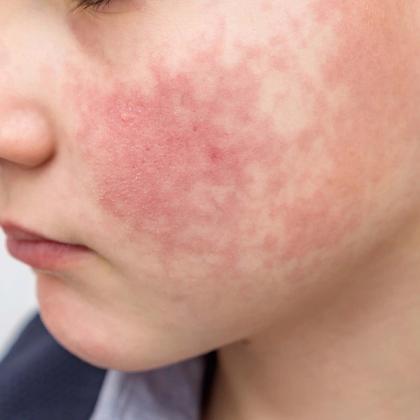Parvovirus B19 (slapped cheek syndrome) is a common and usually mild, self-limiting viral illness. Certain populations, such as pregnant women and their unborn babies, those who are immunocompromised or those with underlying haematological conditions, are at increased risk of complications as the virus can affect red blood cell production. In this episode, Dr Kate Chesterman explores the common signs and symptoms in healthy individuals, as well as discussing the investigation and management of those at higher risk of complications.
Key take-home points
- For most healthy children and adults, parvovirus B19 causes a mild illness, and complications are rare.
- Children will usually present with a prodromal illness followed 1–2 weeks later by a rash.
- Children commonly develop a macular erythematous rash that classically looks like slapped cheeks on one or both cheeks. A maculopapular rash can then develop 1–4 days after the initial facial rash. This may spread to involve the torso and extremities.
- The typical facial rash seen in children is less common in adults, but adults are more likely to experience a symmetrical polyarthropathy.
- Most cases in healthy people do not require any management beyond symptomatic treatment and reassurance.
- Patients are infectious for approximately 10 days before the rash develops, until 1 day after the rash appears. There is no need for children to be off school once they have developed the rash.
- Vertical transmission from a mother to her unborn child can occur in approximately 30% of cases and is most common if the infection occurs between 9 and 20 weeks’ gestation.
- Infection of a foetus can result in haemolysis and hydrops fetalis.
- A pregnant woman’s immunity needs to be determined as soon as possible. Parvovirus B19-specific immunoglobulin M (IgM) and immunoglobulin G (IgG) will help to determine the presence or absence of an acute infection, as well as the patient’s past exposure and therefore immunity.
- If a patient is IgG-positive and IgM-negative, she has previous exposure to parvovirus and is therefore immune.
- If a patient is IgG-negative and IgM-negative, there is no current evidence of acute infection, but she is susceptible to parvovirus B19. Further testing is recommended 1 month after the last contact, even if she remains asymptomatic. If she develops symptoms, re-testing should be performed sooner.
- If the sample is positive for IgM, this suggests a recent infection. The patient should also be immediately referred for obstetric consultant-led care.
- People with an underlying haematological condition such as hereditary spherocytosis, sickle cell disease or thalassaemia are at risk of developing an aplastic crisis if they contract parvovirus B19.
- Immunocompromised patients are at risk of developing a persistent infection as they are unable to eradicate the virus. This can cause chronic red cell aplasia, resulting in severe anaemia.
- Involvement of appropriate secondary-care teams, including haematology, will be required to manage these patients, and regular full blood count and reticulocyte monitoring will be required for those with acute or chronic infections, as well as those presenting with symptoms of anaemia.
Key references
- NHS. 2024. https://www.nhs.uk/conditions/slapped-cheek-syndrome/.
- NHS Lanarkshire. 2025. https://rightdecisions.scot.nhs.uk/media/uovnpm1f/pdf-erythrovirus-b19-parvovirus-guideline-march-2025-v2.pdf.
- NHS University Hospital Southampton. 2024. https://www.uhs.nhs.uk/Media/UHS-website-2019/Patientinformation/Pregnancyandbirth/Parvovirus-B19-during-pregnancy-3648-PIL.pdf.
- NHS North Bristol Trust. https://www.nbt.nhs.uk/maternity-services/pregnancy/routine-screening-tests-scans/parvovirus-b19.
- BMJ Best Practice. 2024. https://bestpractice.bmj.com/topics/en-gb/684.
Create an account to add page annotations
Add information to this page that would be handy to have on hand during a consultation, such as a web address or phone number. This information will always be displayed when you visit this page
